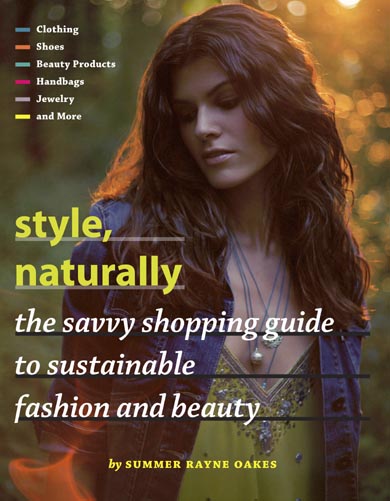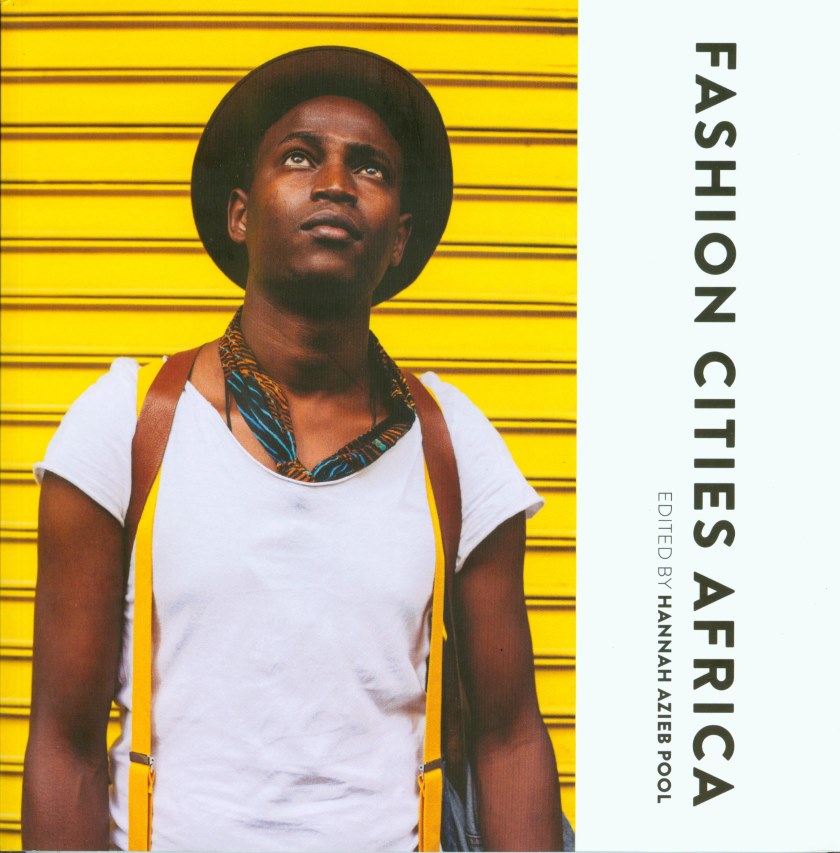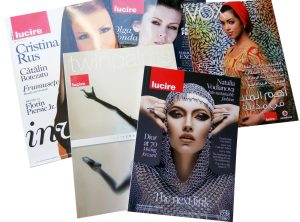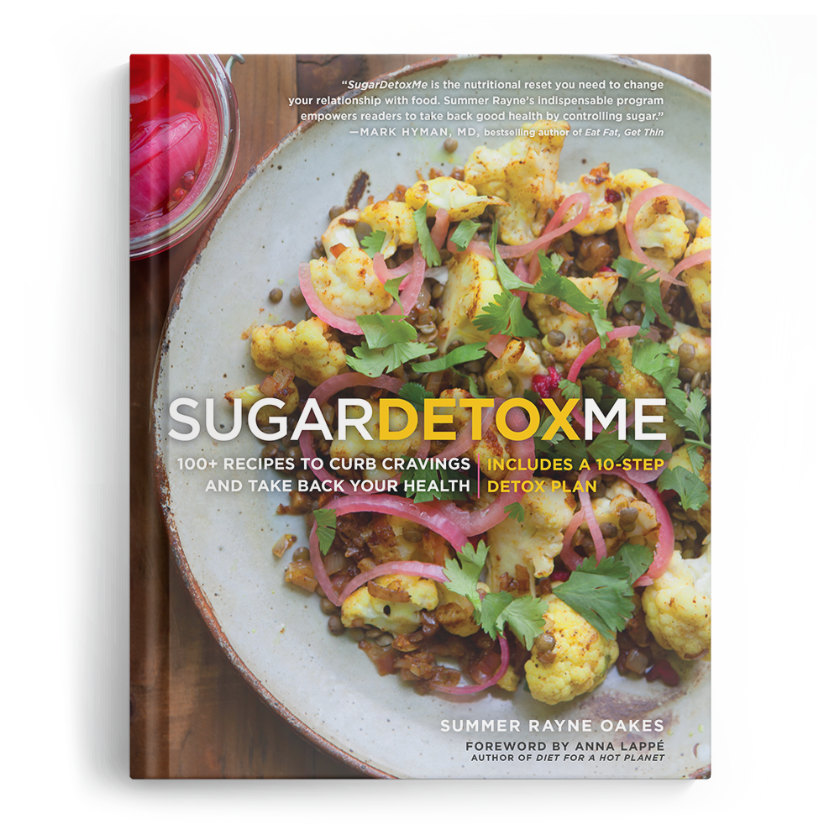
Above: Summer Rayne Oakes’s SugarDetoxMe: 100+ Recipes to Curb Cravings and Take Back Your Health, the result of a “sugar cleanse” she went on from 2014. To get people off sugar, Summer Rayne’s even created a programme to help others do the same. Below left: Summer Rayne Oakes.
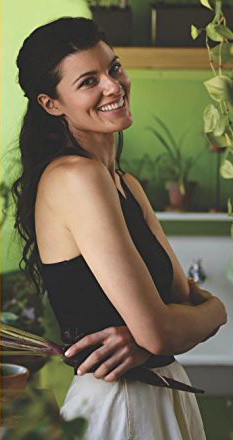
I never thought I could nix my sweet tooth. I just figured it’s something that you’re born with. To a large extent, that’s actually true. Not only are humans programmed to prefer sweet over bitter, (which is no doubt an evolutionary advantage, as many bitter tastes are actually poisonous), but by the time we’re born and as we’re growing, our taste is already fairly developed.
The latter part is courtesy of a number of factors, including what our mother chose to eat while we were in utero, whether we were breast-fed or formula fed, and even now—what evidence suggests—what our Dads and even grandparents ate. The last point I made is not one to gloss over. If the evidence, which has presented itself today, is correct, then the food choices we put into our bodies today—will affect several unborn generations after us. In sum, we’re making direct health decisions for people who are yet to be born!
With all of our “advances” in medical care, we must ask ourselves why is life expectancy dropping for the first time since 1993? When I was born in the mid-’80s, type 2 diabetes—a disease that is inextricably linked to our excessive sugar intake—was known as ‘adult-onset diabetes’. Now in just three decades, it’s common among children, affects 1 in 11 adults worldwide, 37 per cent of whom live in the western Pacific region; and one in seven births is impacted by gestational diabetes. In New Zealand alone, nearly 286,000 people were diagnosed with diabetes in 2015—a doubling over the last decade. If the rate continues at this pace, diabetes is projected to cost Kiwis more than $1,000 million in annual health care costs in five years’ time.
The statistics seem startling enough, but perhaps not as startling as something closer to home, like the amount of free sugars—or sugars not bound by fibre—that we’re consuming on a daily basis. The upper limit of free sugars for the day—and I emphasize the word upper—is 6 teaspoons for a woman, 9 for a man. However, New Zealanders, in particular, are consuming around 27 teaspoons per day per person, according to the Sugar Research Advisory Service. That’s well over three to four times the upper limit for the day!
About three years ago now, I began working in the world of “good” food. We were experimenting with an idea as to whether we could get farm-fresh food into people’s fridges more efficiently. When working so closely with farmers and food makers, you inevitably home in on what you’re eating—and how it makes you feel. I always considered myself a healthy eater in general. My parents have always been health-conscious and we largely grew our own food. Unlike my parents, however, I struggled with a sugar tooth; one that has left me with many memories of hoarding sweet things. I finally had the time to ask, ‘Why?’ and to begin to probe how this one ingredient has seemingly snuck its way into three out of four products on our supermarket shelves.
This curiosity and the need to know how to overcome my seemingly innate sugar habit led me on a Nancy Drew-like investigation; I began researching all I could about our relationship to the sweet stuff, and started documenting my “sugar cleanse” via sugardetox.me, which later led to an easy-to-follow, empowering programme to help others do the same and most recently, a cookbook and guide on the very topic.
Free sugars have become so prevalent in our food that the average person might not even realize that he or she is tipping the sugar scale even before heading out the door in the morning. This particular ingredient has a way of changing our brain chemistry, too—acting as a hyper-stimulus to trigger our brains and bodies to release dopamine, serotonin, and other neurotransmitters. In sum, it keeps us hooked and trapped in a vicious cycle of ups and downs throughout the day.
It’s part of the reason why reducing or eliminating free sugars from your diet is not a diet. It’s simply removing a potentially deleterious substance from one’s body—much in the same way an alcoholic needs to remove alcohol from his or her system. This may, at first, seem a little counter-intuitive, but the ingredient is heavily taxing our bodies to the point that some scientists are now calling it a ‘chronic [versus acute] liver toxin’. Over time, it affects our body’s own natural abilities to detoxify themselves. This in turn can cause inflammation, energy slumps, skin problems, obesity, and disease. Though some medical practitioners would be hard pressed to call excessive sugar intake an “addiction”, more signs point to the fact that it is—from brain-imaging scans to the rise of sugar-addiction clinics.
As those of us who have begun to eradicate free sugars from their diets know, you begin to taste real ingredients again. Our taste buds have plasticity, renewing themselves, and adjusting taste preferences to the food we feed our bodies and our cells. A freshly picked summer tomato is sumptuously sweet; but to those of us who are used to overdosing on a hyper-stimulating cola, the best sun-ripened tomato from the farm might seem fairly bland.
Our appreciation for real food is within our reach—if we give our taste buds time to acclimate from that which is hyper-stimulating. It’s not impossible to curb your sweet tooth, as I have found out. We are, after all, masters of our own destiny. Some of us have to contend with more challenging, uphill battles—but when we have the curiosity and will to understand our body’s needs and wants, then we’re already primed towards a path to better health. I encourage and invite everyone to take the time to explore their own personal cravings and relationship to food, as none of us have the same story or experience. I assure you that when you’re able to put your own puzzle pieces together to see the whole picture, you begin to feel empowered to discover the path towards health that is right for you!—Summer Rayne Oakes, Editor-at-large

